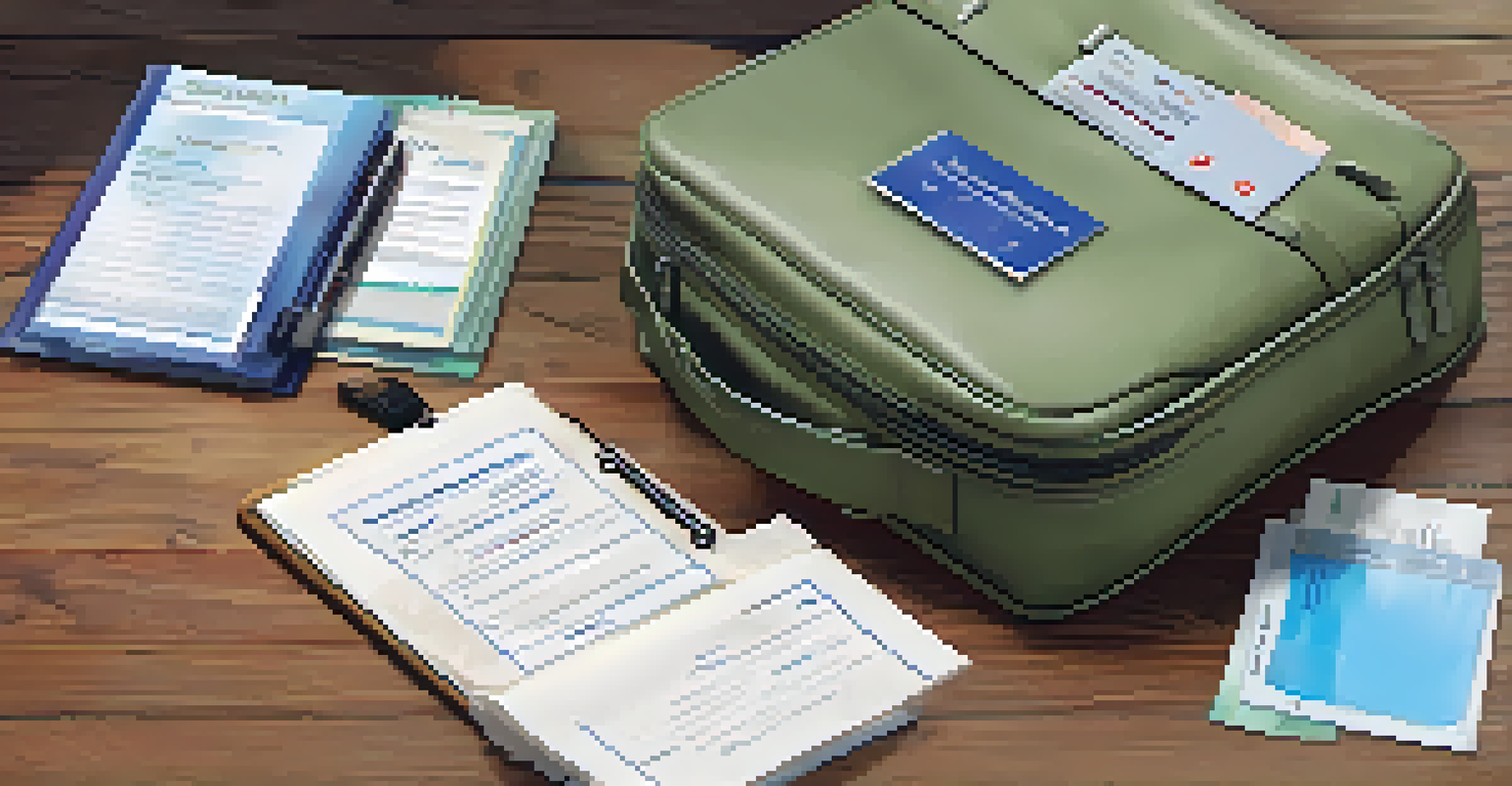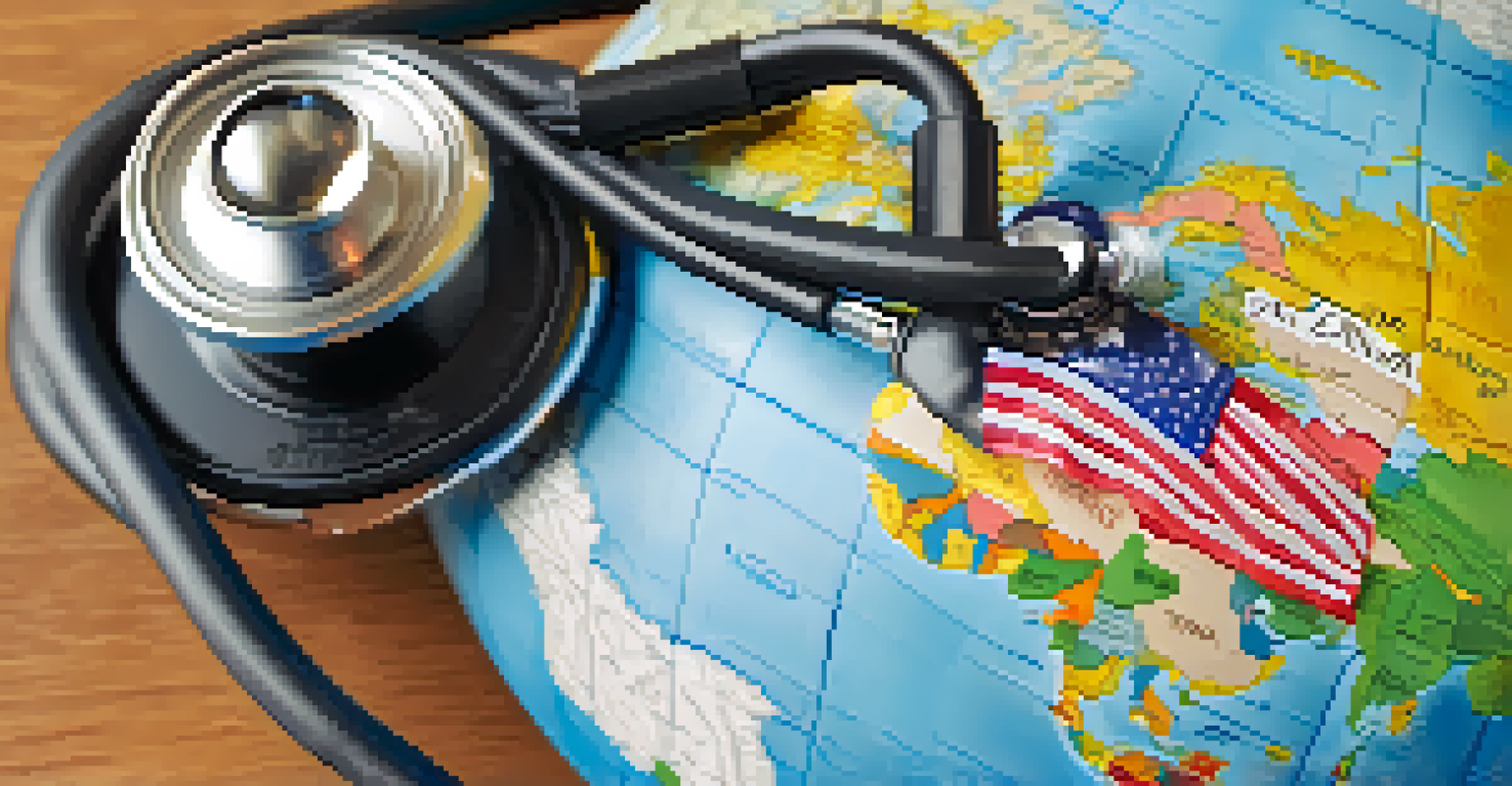Navigating Travel Health Regulations: What You Need to Know

Understanding Travel Health Regulations Basics
Travel health regulations are rules and guidelines that ensure travelers remain healthy while exploring new destinations. They often involve vaccination requirements, health declarations, and specific protocols based on travel history. Understanding these regulations can help you avoid last-minute issues and ensure a smooth journey.
Traveling – it leaves you speechless, then turns you into a storyteller.
For instance, some countries may require proof of vaccination against diseases like yellow fever, especially if you’re coming from an area where the disease is prevalent. Being aware of these regulations before you travel allows you to prepare in advance, ensuring you have the necessary documentation.
Moreover, these regulations can change frequently, especially in response to global health situations. Staying informed about the latest updates can save you from unexpected delays or entry refusals at your destination.
Key Documents You Should Prepare
When planning your trip, it's crucial to gather all necessary health-related documents. This may include vaccination certificates, health insurance information, and any required health declarations. Having these documents ready can streamline your travel experience and minimize potential hassles at the airport.

For example, the International Certificate of Vaccination (ICV) is often required to show proof of vaccination. If you’re traveling internationally, checking if your destination accepts this certificate can save you from complications upon arrival.
Know Travel Health Regulations
Understanding travel health regulations helps avoid last-minute issues and ensures a smooth journey.
Additionally, some countries may require specific forms to be filled out prior to arrival, especially during health crises. Keeping these documents organized and easily accessible can help ensure a smooth check-in process.
Vaccination Requirements for International Travel
Vaccination requirements can vary significantly from one country to another, making research essential. Some destinations may mandate vaccinations for diseases like Hepatitis A, Typhoid, or COVID-19, while others may not. Knowing what’s required can help you stay compliant and healthy during your travels.
The journey not the arrival matters.
For instance, if you’re planning a trip to a tropical region, you might need vaccines for diseases that are less common in your home country. Failing to get the recommended vaccinations could not only jeopardize your health but also result in denied entry.
Consulting with a travel health specialist can provide tailored advice based on your itinerary and health history. This proactive approach can enhance your travel experience and provide peace of mind.
Health Insurance Considerations While Traveling
Health insurance plays a vital role in travel planning, especially regarding travel health regulations. It's essential to ensure your health insurance covers you internationally and includes provisions for emergencies. Having the right coverage can help you access necessary medical care without incurring exorbitant costs.
For example, if you were to fall ill while traveling abroad, having adequate insurance could mean the difference between receiving timely treatment and facing significant out-of-pocket expenses. Some countries even require proof of insurance before allowing entry, so check the specifics of your destination.
Prepare Essential Health Documents
Gathering necessary health-related documents, such as vaccination certificates and health insurance, can streamline your travel experience.
Additionally, consider supplemental travel insurance that covers evacuation and repatriation, as these can be crucial in emergencies. Being prepared financially can alleviate stress and ensure a safer journey.
COVID-19 Protocols and Their Impact on Travel
The COVID-19 pandemic has dramatically altered travel health regulations worldwide. Many countries have implemented specific protocols, such as testing requirements, quarantine measures, and mask mandates. Being aware of these guidelines is crucial for a hassle-free travel experience.
For example, some destinations may require a negative COVID-19 test taken within a specific timeframe before arrival. In contrast, others may impose a mandatory quarantine upon entry, which can significantly affect your travel plans.
Staying updated on these protocols can help you plan accordingly, ensuring you have the necessary tests or documentation ready. Embracing flexibility in your travel plans is also wise, as regulations can change rapidly.
Adapting to Local Health Practices
When traveling, it’s essential to respect and adapt to the local health practices of your destination. Different countries may have unique customs, health protocols, or even cultural attitudes towards health and hygiene. Being aware of these differences can enhance your experience and show respect for local communities.
For instance, some cultures may prioritize hand sanitization or mask-wearing in public spaces, while others might have specific dietary restrictions. Observing and following these practices can help you avoid misunderstandings and foster positive interactions with locals.
Stay Updated on COVID-19 Protocols
Being aware of evolving COVID-19 protocols is crucial for a hassle-free travel experience.
Additionally, familiarizing yourself with local healthcare facilities and services can be beneficial. Knowing where to seek help in case of illness or injury can provide peace of mind during your travels.
Resources for Staying Informed on Travel Health Regulations
With travel health regulations constantly evolving, utilizing reliable resources is key to staying informed. Websites like the World Health Organization (WHO) or the Centers for Disease Control and Prevention (CDC) offer valuable updates on health advisories and regulations. Regularly checking these sites can keep you abreast of any changes that might affect your travel plans.
Moreover, travel agencies and airlines often provide the latest information regarding health requirements for specific destinations. They can be excellent sources for understanding what documentation and precautions are necessary.

Engaging with fellow travelers through forums or social media can also offer insights and firsthand experiences. These resources can provide practical advice that enhances your travel preparation.